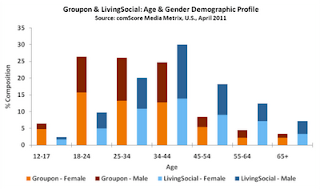"—The study surveyed 324 businesses across 23 U.S. markets that participated in daily deal promotions between August 2009 and March 2011. 55.5 percent of those businesses reported making money on the deal, 26.6 percent lost money, and 17.9 percent broke even.
[...]
—On average, nearly 80 percent of deal users were new customers for the business, but just 35.9 percent of them spent more than the deal’s face value. 19.9 percent returned to the business to make a full-priced purchase. OpenTable does better with repeat customers: 51.9 percent of OpenTable deal users were new customers, and 30 percent of OpenTable deal users came to the restaurant again.
—21.7 percent of deal buyers never actually redeemed the deals they purchased. On the one hand, that’s a good thing for the business offering the daily deal: Non-redemption makes the deal more profitable for them. On the other hand, when deal buyers don’t redeem the deal, businesses don’t get the exposure they sought in the first place. The report recommends, “To increase the likelihood of a profitable promotion, businesses should consider offering a daily deal of relatively high face value ($50 or more), with a shallow discount (at most 25% off face value), a short redemption period (three months or less), and place a maximum limit on number of deal vouchers that consumers can buy.”"


